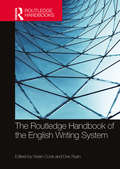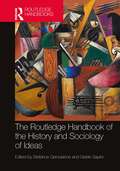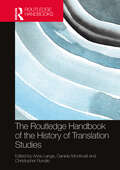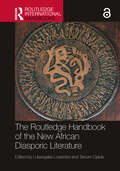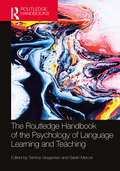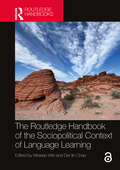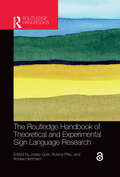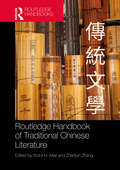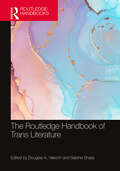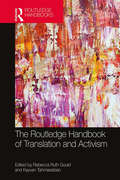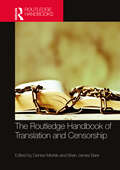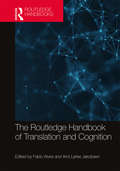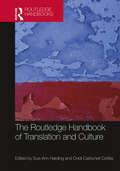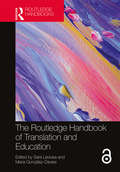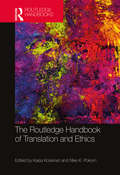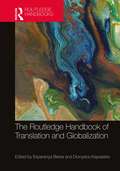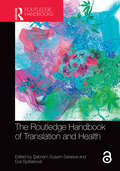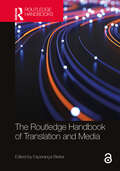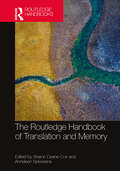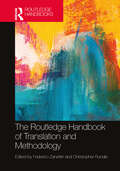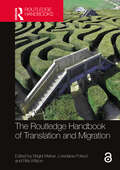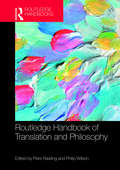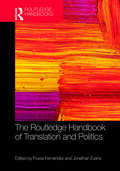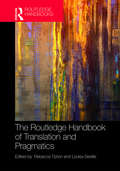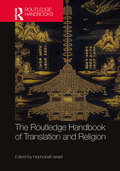- Table View
- List View
The Routledge Handbook of the English Writing System (Routledge Handbooks in Linguistics)
by Vivian Cook Des RyanThe Routledge Handbook of the English Writing System provides a comprehensive account of the English writing system, both in its current iteration and highlighting the developing trends that will influence its future. Twenty-nine chapters written by specialists from around the world cover core linguistic and psychological aspects, and also include areas from other disciplines such as typography and computer-mediated communication. Divided into five parts, the volume encompasses a wide range of approaches and addresses issues in the following areas: theory and the English writing system, discussing the effects of etymology and phonology; the history of the English writing system from its earliest development, including spelling, pronunciation and typography; the acquisition and teaching of writing, with discussions of literacy issues and dyslexia; English writing in use around the world, both in the UK and America, and also across Europe and Japan; computer-mediated communication and developments in writing online and on social media. The Routledge Handbook of the English Writing System is essential reading for researchers and postgraduate students working in this area.
The Routledge Handbook of the History and Sociology of Ideas
by Stefanos GeroulanosThe Routledge Handbook of the History and Sociology of Ideas establishes a new and comprehensive way of working in the history and sociology of ideas, in order to obviate several longstanding gaps that have prevented a fruitful interdisciplinary and international dialogues. Pushing global intellectual history forward, it uses methodological innovations in the history of concepts, gender history, imperial history, and history of normativity, many of which have emerged out of intellectual history in recent years, and it especially foregrounds the role of field theory for delimiting objects of study but also in studying transnational history and migration of persons and ideas. The chapters also explore how intellectual history crosses the study of particular domains: law, politics, economy, science, life sciences, social and human sciences, book history, literature, and emotions.
The Routledge Handbook of the History of Translation Studies (Routledge Handbooks in Translation and Interpreting Studies)
by Anne Lange Daniele Monticelli Christopher RundleThe Routledge Handbook of the History of Translation Studies is an exploration of the history of translation and interpreting studies (TIS) as a field of intellectual enquiry. The volume covers the evolution of thinking on translation, from the earliest discourses in Assyria, Egypt, Israel, China, India, Greece, and Rome, up to the early 20th century when TIS emerged as an identifiable academic field. The volume also traces the institutionalization of TIS and its key concepts from their beginnings in the 1920s in Ukraine up to their contemporary interdisciplinary manifestations. Written by leading international scholars, many of whom played a direct role in the events they describe, the chapters in this volume provide a comprehensive and in-depth account of the birth and consolidation of translation and interpreting studies as a thriving interdiscipline. With a focus on providing readers with the methodological and theoretical tools they need to conduct research, as well as background in the historiography of TIS, this handbook is an indispensable resource for all students and researchers of translation and interpreting studies.
The Routledge Handbook of the New African Diasporic Literature (Routledge International Handbooks)
by Lokangaka Losambe Tanure OjaideThe Routledge Handbook of the New African Diasporic Literature introduces world literature readers to the transnational, multivocal writings of immigrant African authors. Covering works produced in Europe, North America, and elsewhere in the world, this book investigates three major aesthetic paradigms in African diasporic literature: the Sankofan wave (late 1960s–early 1990s); the Janusian wave (1990s–2020s); and the Offshoots of the New Arrivants (those born and growing up outside Africa).Written by well-established and emerging scholars of African and diasporic literatures from across the world, the chapters in the book cover the works of well-known and not-so-well-known Anglophone, Francophone, and Lusophone writers from different theoretical positionalities and critical approaches, pointing out the unique innovative artistic qualities of this major subgenre of African literature. The focus on the “diasporic consciousness” of the writers and their works sets this handbook apart from others that solely emphasize migration, which is more of a process than the community of settled African people involved in the dynamic acts of living reflected in diasporic writings.This book will appeal to researchers and students from across the fields of Literature, Diaspora Studies, African Studies, Migration Studies, and Postcolonial Studies.
The Routledge Handbook of the Psychology of Language Learning and Teaching (Routledge Handbooks in Applied Linguistics)
by Tammy Gregersen Sarah MercerThis state-of-the-art volume is the first to capture a hybrid discipline that studies the role and linguistic implications of the human mind in language learning and teaching. This Handbook considers individual as well as collective factors in language learners and teachers from an array of new empirical constructs and theoretical perspectives, including implications for practice and “myths, debates, and disagreements” in the field, and points to future directions for research. This collection of stellar contributions is an essential resource for researchers, advanced students, and teachers working in applied linguistics, second language acquisition, psychology, and education.
The Routledge Handbook of the Sociopolitical Context of Language Learning (Routledge Handbooks of Language Learning in the Global Context)
by Weixiao Wei Der-Lin ChaoThe Routledge Handbook of the Sociopolitical Context of Language Learning is a compelling examination of how language education must adapt to our rapidly changing world. This book explores the need for a fresh perspective on language learning, moving beyond traditional methods to address the complexities of today’s global landscape. It delves into the impact of geopolitical shifts, cultural exchanges, and social justice issues on language education.The book offers a blend of theoretical insights and practical approaches, highlighting how language learning intersects with global politics and cultural diversity. It examines case studies from various countries, including Ukraine and Oman, to reveal how language policies and practices are evolving in response to contemporary challenges. By integrating themes of identity, equity, and intercultural understanding, the book presents groundbreaking content that pushes for more inclusive and effective language education.Ideal for educators, policymakers, and anyone interested in the future of language learning, this book provides valuable perspectives on how to rethink and redesign language education to better serve a diverse and interconnected world. It offers practical strategies and thought-provoking analyses, making it an essential resource for navigating the complexities of modern language teaching and learning.
The Routledge Handbook of Theoretical and Experimental Sign Language Research (Routledge Handbooks in Linguistics)
by Josep QuerThe Routledge Handbook of Theoretical and Experimental Sign Language Research bridges the divide between theoretical and experimental approaches to provide an up-to-date survey of key topics in sign language research. With 29 chapters written by leading and emerging scholars from around the world, this Handbook covers the following key areas: On the theoretical side, all crucial aspects of sign language grammar studied within formal frameworks such as Generative Grammar; On the experimental side, theoretical accounts are supplemented by experimental evidence gained in psycho- and neurolinguistic studies; On the descriptive side, the main phenomena addressed in the reviewed scholarship are summarized in a way that is accessible to readers without previous knowledge of sign languages. Each chapter features an introduction, an overview of existing research, and a critical assessment of hypotheses and findings. The Routledge Handbook of Theoretical and Experimental Sign Language Research is key reading for all advanced students and researchers working at the intersection of sign language research, linguistics, psycholinguistics, and neurolinguistics.
Routledge Handbook of Traditional Chinese Literature
by Victor H. Mair Zhenjun ZhangThis Handbook presents a comprehensive overview of 3,000 years of Chinese literature from its earliest beginnings to the end of the Qing (1644–1911), the last empire of China. With a focus on well-known authors and masterpieces in each important genre, this volume covers verses, prose, drama, and fiction arranged in the following thematic groupings: Pre-Qin and Han poetry, poetry of the Six Dynasties, poetry of the Tang, poetry of the Song, and lyrics of the Song Prose of historians, prose of philosophers, and literati prose Tragedy and romance in Yuan drama, southern plays of ethics, and chuanqi plays of the Ming and the Qing Classical-language tales, vernacular short stories, heroic romances, novels of spirits and devils, novels of manners and satire, and novels of social exposure and prostitution Featuring both introductions and in-depth analyses, this Handbook incorporates the most recent scholarly works for each entry and also facilitates future research by providing further readings. Authored by a stellar line-up of experts in the field of Chinese literature, this is an essential reference guide for all students and scholars in the fields of Chinese literature and culture.
The Routledge Handbook of Trans Literature (Routledge Literature Handbooks)
by Douglas A. Vakoch Sabine SharpThe Routledge Handbook of Trans Literature examines the intersection of transgender studies and literary studies, bringing together essays from global experts in the field. This volume provides a comprehensive overview of trans literature, highlighting the core topics, genres, and periods important for scholarship now and in the future.Covering the main approaches and key literary genres of the area, this volume includes: Examination of the core topics guiding contemporary trans literary theory and criticism, including the Anthropocene, archival speculation, activism, BDSM, Black studies, critical plant studies, culture, diaspora, disability, ethnocentrism, home, inclusion, monstrosity, nondualist philosophies, nonlinearity, paradox, pedagogy, performativity, poetics, religion, suspense, temporality, visibility, and water. Exploration of diverse literary genres, forms, and periods through a trans lens, such as archival fiction, artificial intelligence narratives, autobiography, climate fiction, comics, creative writing, diaspora fiction, drama, fan fiction, gothic fiction, historical fiction, manga, medieval literature, minor literature, modernist literature, mystery and detective fiction, nature writing, poetry, postcolonial literature, radical literature, realist fiction, Renaissance literature, Romantic literature, science fiction, travel writing, utopian literature, Victorian literature, and young adult literature. This comprehensive volume will be of great interest to scholars and students of literature, gender studies, trans studies, literary theory, and literary criticism.
The Routledge Handbook of Translation and Activism (Routledge Handbooks in Translation and Interpreting Studies)
by Rebecca Ruth GouldThe Routledge Handbook of Translation and Activism provides an accessible, diverse and ground-breaking overview of literary, cultural, and political translation across a range of activist contexts. As the first extended collection to offer perspectives on translation and activism from a global perspective, this handbook includes case studies and histories of oppressed and marginalised people from over twenty different languages. The contributions will make visible the role of translation in promoting and enabling social change, in promoting equality, in fighting discrimination, in supporting human rights, and in challenging autocracy and injustice across the Middle East, Africa, Latin America, East Asia, the US and Europe. With a substantial introduction, thirty-one chapters, and an extensive bibliography, this Handbook is an indispensable resource for all activists, translators, students and researchers of translation and activism within translation and interpreting studies.
The Routledge Handbook of Translation and Censorship (Routledge Handbooks in Translation and Interpreting Studies)
by Denise Merkle Brian James BaerThe Routledge Handbook of Translation and Censorship is the first handbook to provide a comprehensive overview of the topic, offering broad geographic and historical coverage, and extending the political contexts to incorporate colonial and postcolonial viewpoints, as well as pluralistic societies. It examines key cultural texts of all kinds as well as audio-visual translation, comics, drama and videogames.With over 30 chapters, the Handbook highlights commonalities and differences across the various contexts, encouraging comparative approaches to the topic of translation and censorship. Edited and authored by leading figures in the field of Translation Studies, the chapters provide a critical mapping of the current research and suggest future directions.With an introductory chapter by the editors on theorizing censorship, the Handbook is an essential reference and resource for advanced students, scholars and researchers in translation studies, comparative literature and related fields.
The Routledge Handbook of Translation and Cognition (Routledge Handbooks in Translation and Interpreting Studies)
by Fabio AlvesThe Routledge Handbook of Translation and Cognition provides a comprehensive, state-of-the-art overview of how translation and cognition relate to each other, discussing the most important issues in the fledgling sub-discipline of Cognitive Translation Studies (CTS), from foundational to applied aspects. With a strong focus on interdisciplinarity, the handbook surveys concepts and methods in neighbouring disciplines that are concerned with cognition and how they relate to translational activity from a cognitive perspective. Looking at different types of cognitive processes, this volume also ventures into emergent areas such as neuroscience, artificial intelligence, cognitive ergonomics and human–computer interaction. With an editors’ introduction and 30 chapters authored by leading scholars in the field of Cognitive Translation Studies, this handbook is the essential reference and resource for students and researchers of translation and cognition and will also be of interest to those working in bilingualism, second-language acquisition and related areas.
The Routledge Handbook of Translation and Culture (Routledge Handbooks in Translation and Interpreting Studies)
by Sue-Ann Harding Ovidi Carbonell CortesThe Routledge Handbook of Translation and Culture collects into a single volume thirty-two state-of-the-art chapters written by international specialists, overviewing the ways in which translation studies has both informed, and been informed by, interdisciplinary approaches to culture. The book's five sections provide a wealth of resources, covering both core issues and topics in the first part. The second part considers the relationship between translation and cultural narratives, drawing on both historical and religious case studies. The third part covers translation and social contexts, including the issues of cultural resistance, indigenous cultures and cultural representation. The fourth part addresses translation and cultural creativity, citing both popular fiction and graphic novels as examples. The final part covers translation and culture in professional settings, including cultures of science, legal settings and intercultural businesses. This handbook offers a wealth of information for advanced undergraduates, postgraduates and researchers working in translation and interpreting studies.
The Routledge Handbook of Translation and Education (Routledge Handbooks in Translation and Interpreting Studies)
by Sara Laviosa Maria González-DaviesThe Routledge Handbook of Translation and Education will present the state of the art of the place and role of translation in educational contexts worldwide. It lays a sound foundation for the future interdisciplinary cooperation between Translation Studies and Educational Linguistics. By adopting a transdisciplinary perspective, the handbook will bring together the various fields of scholarly enquiry and practice that make a valuable contribution to enlarging the notion of translation and diversifying its uses in education. Each contribution provides an overview of the historical background to a given educational setting. Focusing on current research approaches and empirical findings, this volume outlines the development of pedagogical approaches, methods, assessment and curriculum design. The handbook also examines examples of pedagogies that integrate translation in the curriculum, the teaching method’s approach, design and procedure as well as assessment. Based on a multilingual and applied-oriented approach, the handbook is essential reading for postgraduate students, researchers and advanced undergraduate students of Translation Studies, and educationalists and educators in the 21st century post-global era.
The Routledge Handbook of Translation and Ethics (Routledge Handbooks in Translation and Interpreting Studies)
by Kaisa Koskinen; Nike K. PokornThe Routledge Handbook of Translation and Ethics offers a comprehensive overview of issues surrounding ethics in translating and interpreting. The chapters chart the philosophical and theoretical underpinnings of ethical thinking in Translation Studies and analyze the ethical dilemmas of various translatorial actors, including translation trainers and researchers. Authored by leading scholars and new voices in the field, the 31 chapters present a wide coverage of emerging issues such as increasing technologization of translation, posthumanism, volunteering and activism, accessibility and linguistic human rights. Many chapters provide the first extensive overview of the topic or present new takes on established areas. The book is divided into four parts, with the first covering the most influential ethical theories. Part II takes the perspective of agents in different contexts and the ethical dilemmas they face, while Part III takes a critical look at central institutions structuring and controlling ethical behaviour. Finally, Part IV focuses on special issues and new challenges, and signals new directions for further study. This handbook is an indispensable resource for all students and researchers of translation and ethics within translation and interpreting studies, multilingualism and comparative literature.
The Routledge Handbook of Translation and Globalization (Routledge Handbooks in Translation and Interpreting Studies)
by Esperança Bielsa Kapsaskis DionysiosThis is the first handbook to provide a comprehensive coverage of the main approaches that theorize translation and globalization, offering a wide-ranging selection of chapters dealing with substantive areas of research. The handbook investigates the many ways in which translation both enables globalization and is inevitably transformed by it. Taking a genuinely interdisciplinary approach, the authors are leading researchers drawn from the social sciences, as well as from translation studies. The chapters cover major areas of current interdisciplinary interest, including climate change, migration, borders, democracy and human rights, as well as key topics in the discipline of translation studies. This handbook also highlights the increasing significance of translation in the most pressing social, economic and political issues of our time, while accounting for the new technologies and practices that are currently deployed to cope with growing translation demands. With five sections covering key concepts, people, culture, economics and politics, and a substantial introduction and conclusion, this handbook is an indispensable resource for students and researchers of translation and globalization within translation and interpreting studies, comparative literature, sociology, global studies, cultural studies and related areas.
The Routledge Handbook of Translation and Health (Routledge Handbooks in Translation and Interpreting Studies)
by Şebnem Susam-SaraevaThe Routledge Handbook of Translation and Health provides a bridge between translation studies and the burgeoning field of health humanities, which seeks novel ways of understanding health and illness. As discourses around health and illness are dependent on languages for their transmission, impact, spread, acceptance and rejection in local settings, translation studies offers a wealth of data, theoretical approaches and methods for studying health and illness globally. Translation and health intersect in a multitude of settings, historical moments, genres, media and users. This volume brings together topics ranging from interpreting in healthcare settings to translation within medical sciences, from historical and contemporary travels of medicine through translation to areas such as global epidemics, disaster situations, interpreting for children, mental health, women’s health, disability, maternal health, queer feminisms and sexual health, and nutrition. Contributors come from a wide range of disciplines, not only from various branches of translation and interpreting studies, but also from disciplines such as psychotherapy, informatics, health communication, interdisciplinary health science and classical Islamic studies. Divided into four sections and each contribution written by leading international authorities, this timely Handbook is an indispensable resource for all students and researchers of translation and health within translation and interpreting studies, as well as medical and health humanities. Intorduction and Chapter 18 of this book are freely available as a downloadable Open Access PDF at http://www.taylorfrancis.com under a Creative Commons [Attribution-Non Commercial-No Derivatives (CC-BY-NC-ND)] 4.0 license.
The Routledge Handbook of Translation and Media (Routledge Handbooks in Translation and Interpreting Studies)
by Esperança BielsaThe Routledge Handbook of Translation and Media provides the first comprehensive account of the role of translation in the media, which has become a thriving area of research in recent decades. It offers theoretical and methodological perspectives on translation and media in the digital age, as well as analyses of a wide diversity of media contexts and translation forms. Divided into four parts with an editor introduction, the 33 chapters are written by leading international experts and provide a critical survey of each area with suggestions for further reading. The Handbook aims to showcase innovative approaches and developments, bridging the gap between currently separate disciplinary subfields and pointing to potential synergies and broad research topics and issues. With a broad-ranging, critical and interdisciplinary perspective, this Handbook is an indispensable resource for all students and researchers of translation studies, audiovisual translation, journalism studies, film studies and media studies.
The Routledge Handbook of Translation and Memory (Routledge Handbooks in Translation and Interpreting Studies)
by Sharon Deane-CoxThe Routledge Handbook of Translation and Memory serves as a timely and unique resource for the current boom in thinking around translation and memory. The Handbook offers a comprehensive overview of a contemporary, and as yet unconsolidated, research landscape with a four-section structure which encompasses both current debate and future trajectories. Twenty-four chapters written by leading and emerging international scholars provide a cross-sectional snapshot of the diverse angles of approach and case studies that have thus far driven research into translation and memory. A valuable, far-reaching range of theoretical, empirical, reflective, comparative, and archival approaches are brought to bear on translational sites of memory and mnemonic sites of translation through the examination of topics such as traumatic, postcolonial, cultural, literary, and translator memory. This Handbook is key reading for advanced undergraduates, postgraduates and researchers in translation studies, memory studies, and related areas.
The Routledge Handbook of Translation and Methodology (Routledge Handbooks in Translation and Interpreting Studies)
by Federico ZanettinThe Routledge Handbook of Translation and Methodology provides a comprehensive overview of methodologies in translation studies, including both well-established and more recent approaches. The Handbook is organised into three sections, the first of which covers methodological issues in the two main paradigms to have emerged from within translation studies, namely skopos theory and descriptive translation studies. The second section covers multidisciplinary perspectives in research methodology and considers their application in translation research. The third section deals with practical and pragmatic methodological issues. Each chapter provides a summary of relevant research, a literature overview, critical issues and topics, recommendations for best practice, and some suggestions for further reading. Bringing together over 30 eminent international scholars from a wide range of disciplinary and geographical backgrounds, this Handbook is essential reading for all students and scholars involved in translation methodology and research.
The Routledge Handbook of Translation and Migration (Routledge Handbooks in Translation and Interpreting Studies)
by Rita Wilson Brigid Maher Loredana PolezziThe Routledge Handbook of Translation and Migration explores the practices and attitudes surrounding migration and translation, aiming to redefine these two terms in light of their intersections and connections. The volume adopts an interdisciplinary and transnational perspective, highlighting the broad scope of migration and translation as not only linguistic and geographical phenomena, but also cultural, social, artistic, and psychological processes.The nexus between migration and translation, the central concern of this Handbook, challenges limited conceptualisations of identity and belonging, thereby also exposing the limitations of monolingual, monocultural models of nationhood. Through a diverse range of approaches and methodologies, individual chapters investigate specific historical circumstances and illustrate the need for an intersectional approach to questions of language access and language mediation.With its range of approaches and case studies, the volume highlights the inherently political nature of translation and its potential to shape social and cultural inclusion, emphasising the crucial role of language and translation in informing professional practices, institutional policies, educational approaches and community attitudes towards migration. By bringing together perspectives from both researchers and creative practitioners, this book makes an innovative contribution to ongoing global discussions on linguistic hospitality and diversity, ideal for those pursing postgraduate and doctoral studies in translation studies, linguistics, international studies and cultural studies.
The Routledge Handbook of Translation and Philosophy (Routledge Handbooks in Translation and Interpreting Studies)
by J Piers Rawling Philip WilsonThe Routledge Handbook of Translation and Philosophy presents the first comprehensive, state of the art overview of the complex relationship between the field of translation studies and the study of philosophy. The book is divided into four sections covering discussions of canonical philosophers, central themes in translation studies from a philosophical perspective, case studies of how philosophy has been translated and illustrations of new developments. With twenty-nine chapters written by international specialists in translation studies and philosophy, it represents a major survey of two fields that have only recently begun to enter into dialogue. The Routledge Handbook of Translation and Philosophy is a pioneering resource for students and scholars in translation studies and philosophy alike.
The Routledge Handbook of Translation and Politics (Routledge Handbooks in Translation and Interpreting Studies)
by Jonathan Evans Fruela FernandezThe Routledge Handbook of Translation and Politics presents the first comprehensive, state of the art overview of the multiple ways in which ‘politics’ and ‘translation’ interact. Divided into four sections with thirty-three chapters written by a roster of international scholars, this handbook covers the translation of political ideas, the effects of political structures on translation and interpreting, the politics of translation and an array of case studies that range from the Classical Mediterranean to contemporary China. Considering established topics such as censorship, gender, translation under fascism, translators and interpreters at war, as well as emerging topics such as translation and development, the politics of localization, translation and interpreting in democratic movements, and the politics of translating popular music, the handbook offers a global and interdisciplinary introduction to the intersections between translation and interpreting studies and politics. With a substantial introduction and extensive bibliographies, this handbook is an indispensable resource for students and researchers of translation theory, politics and related areas.
The Routledge Handbook of Translation and Pragmatics (Routledge Handbooks in Translation and Interpreting Studies)
by Rebecca Tipton Louisa DesillaThe Routledge Handbook of Translation and Pragmatics provides an overview of key concepts and theory in pragmatics, charts developments in the disciplinary relationship between translation studies and pragmatics, and showcases applications of pragmatics-inspired research in a wide range of translation, spoken and signed language interpreting activities. Bringing together 22 authoritative chapters by leading scholars, this reference work is divided into three sections: Influences and Intersections, Methodological Issues, and Applications. Contributions focus on features of linguistic pragmatics and their analysis in authentic and experimental data relating to a wide range of translation and interpreting activities, including: news, scientific, literary and audiovisual translation, translation in online social media, healthcare interpreting and audio description for the theatre. It also encompasses contributions on issues beyond the level of the text that include the study of interpersonal relationships in practitioner networks and the development of pragmatic competence in interpreter training. Each chapter includes many practical illustrative examples and a list of recommended reading. Fundamental reading for students and academics in translation and interpreting studies, this is also an essential resource for those working in the related fields of linguistics, communication and intercultural studies.
The Routledge Handbook of Translation and Religion (Routledge Handbooks in Translation and Interpreting Studies)
by Hephzibah IsraelThe Routledge Handbook of Translation and Religion is the first to bring together an extensive interdisciplinary engagement with the multiple ways in which the concepts and practices of translation and religion intersect. The book engages a number of scholarly disciplines in conversation with each other, including the study of translation and interpreting, religion, philosophy, anthropology, history, art history, and area studies. A range of leading international specialists critically engage with changing understandings of the key categories ‘translation’ and ‘religion’ as discursive constructs, thus contributing to the development of a new field of academic study, translation and religion. The twenty-eight contributions, divided into six parts, analyze how translation constructs ideas, texts or objects as 'sacred' or for ‘religious purposes’, often in competition with what is categorized as ‘non-religious.’ The part played by faith communities is treated as integral to analyses of the role of translation in religion. It investigates how or why translation functions in re-constructing and transforming religion(s) and for whom and examines a range of ‘sacred texts’ in translation—from the written to the spoken, manuscript to print, paper to digital, architectural form to objects of sacred art, intersemiotic scriptural texts, and where commentary, exegesis and translation interweave. This Handbook is an indispensable scholarly resource for researchers in translation studies and the study of religions.
